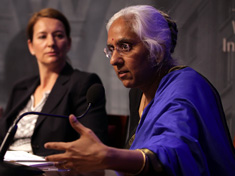-
A Little Respect: Saraswathi Vedam on Reducing Over-Intervention in Maternal Care Through More Autonomy
May 12, 2017 By Sean Peoples Governments and health organizations have made remarkable gains in reducing maternal mortality and morbidity rates around the world. Much of those gains have been driven by increasing capacity, directing more women to hospitals and clinics to ensure they get modern medical care. Increasingly, however, experts are realizing that this push has brought challenges of its own.
Governments and health organizations have made remarkable gains in reducing maternal mortality and morbidity rates around the world. Much of those gains have been driven by increasing capacity, directing more women to hospitals and clinics to ensure they get modern medical care. Increasingly, however, experts are realizing that this push has brought challenges of its own.Governments and health organizations have made remarkable gains in reducing maternal mortality and morbidity rates around the world. Much of those gains have been driven by increasing capacity, directing more women to hospitals and clinics to ensure they get modern medical care. Increasingly, however, experts are realizing that this push has brought challenges of its own.
“We have these huge numbers of women going into hospitals with three to a bed and overcrowded hospitals and terrible conditions, and we have not improved the outcomes,” says Saraswathi Vedam, an associate professor and lead investigator at the University of British Columbia’s Birth Place Lab, in this week’s podcast. “Institutional birth has not been shown to be the answer,” she says. Instead, “it’s about skilled attendants and respectful care.”
Under crowded and hectic conditions, many women feel pressure to undergo unnecessary obstetric interventions that are both expensive and dangerous, including Caesarean sections (C-sections) and episiotomies, a phenomenon The Lancet refers to as “too much, too soon.”
“When we talk about interventions and too much too soon,” Vedam says, “we need to understand who’s making the decisions, what’s driving the decisions.”
The Birth Place Lab created the Mother’s Autonomy in Decision Making (MADM) scale and the Mothers on Respect (MOR) index to help quantify the experiences of expecting women and families and record their perceptions of respect and agency throughout the process.
Among the nearly 3,400 women from various backgrounds who took part in the Changing Childbirth in British Columbia study, for example, 95 percent said it was “very important” or “important” that they lead the decisions about their own pregnancy, birth, and baby care.
Yet, the bulk of the decisions are being driven by providers. Among respondents in three recent maternal care studies, “two in five women felt pressured to have a C-section,” Vedam says. “It wasn’t whether they had the intervention [that affected their perception of care], it was whether or not they felt involved in decision-making.” Women consistently responded to more personalized and higher quality care. Midwifery clients reported more respectful treatment wherever they delivered, Vedam says, as well as higher autonomy scores.
“We think that it has something to do with time,” she says. When women have enough time to consider their options and make more informed choices, maternal care is more collaborative, and costly and risky over-interventions are avoided.
Saraswathi Vedam spoke at the Wilson Center on April 24, 2017.
Friday Podcasts are also available for download on iTunes and Google Podcasts.
Sources: The Lancet, University of British Columbia.
Topics: Canada, community-based, development, Dot-Mom, Friday Podcasts, gender, global health, midwives, podcast, poverty, respectful care, U.S.
 A Publication of the Stimson Center.
A Publication of the Stimson Center.

 Governments and health organizations have made remarkable gains in reducing maternal mortality and morbidity rates around the world. Much of those gains have been driven by increasing capacity, directing more women to hospitals and clinics to ensure they get modern medical care. Increasingly, however, experts are realizing that this push has brought challenges of its own.
Governments and health organizations have made remarkable gains in reducing maternal mortality and morbidity rates around the world. Much of those gains have been driven by increasing capacity, directing more women to hospitals and clinics to ensure they get modern medical care. Increasingly, however, experts are realizing that this push has brought challenges of its own.




